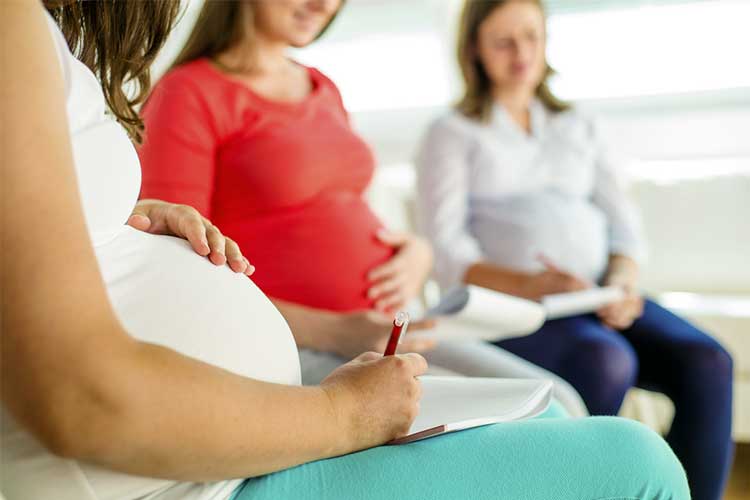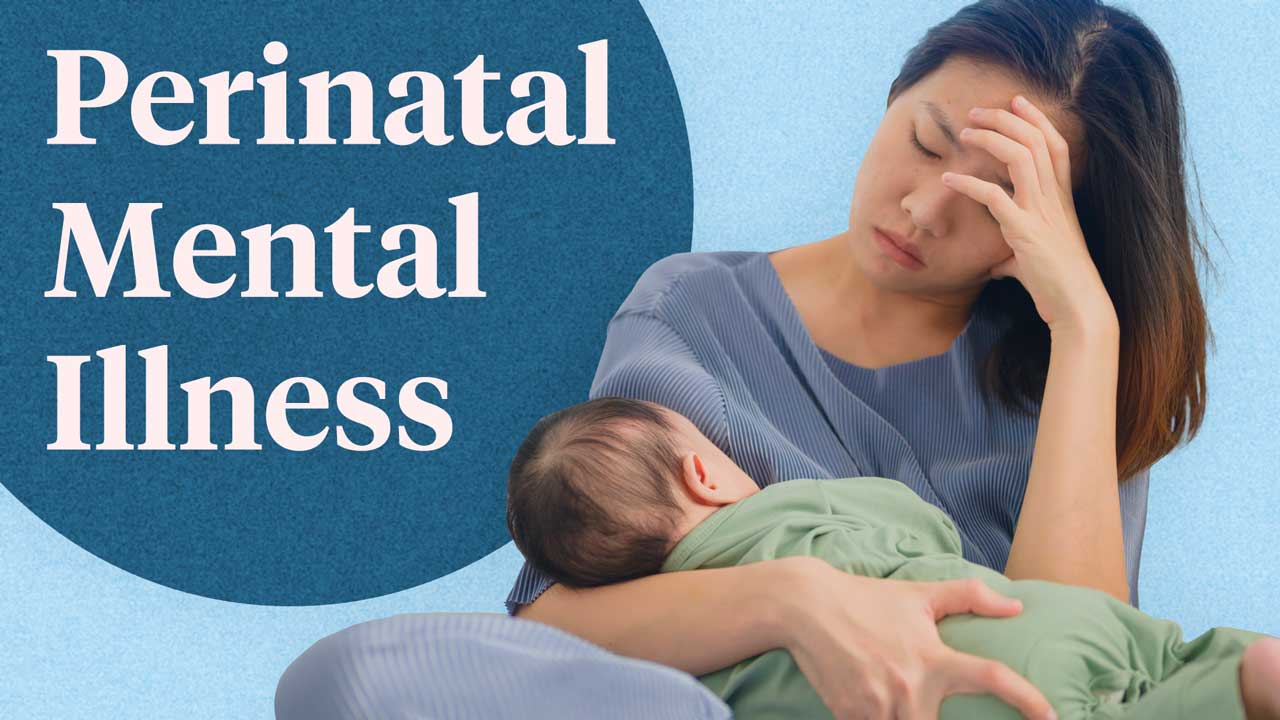Content Warning: This article mentions self-harm and suicide, which some people may find distressing.
Childbirth and new parenthood carry an expectation of joy and happiness, but it’s also a time of great emotional upheaval.
As new parents face adjustments to their lifestyle and relationships, significant mental health problems can develop. This can potentially disrupt the care of the newborn and challenge established family dynamics.
What are Perinatal Mental Health Issues?
The term perinatal mental health issues refers to any mental health problems that affect a new or expecting parent’s mood, behaviour, wellbeing and/or daily functioning (PANDA 2023a).
This definition includes both:
- General mental health conditions that occur during the perinatal period:
- Disorders specific to the perinatal period:
- Psychological birth trauma
- Postpartum psychosis.
(AIHW 2024)
Overall, in Australia, perinatal mental illness affects up to 1 in 5 expecting or new mothers and 1 in 10 expecting or new fathers (SANE 2023).

Recognising Risk Factors for Perinatal Mental Health Issues
Missed or undermanaged mental health problems can have lasting negative effects on maternal self-esteem, partner and family relationships, and the mental and social wellbeing of the child (Stein & Pearson et al., as cited in RC Psych 2021).
The question is: how can perinatal mental health issues be recognised so that effective help can be offered early?
Identified risk factors for perinatal mental health issues include but are not limited to:
- Personal or family history of mental illness
- History of abuse, trauma or intimate partner violence
- Lack of social support
- Low socioeconomic status
- Poor sleep
- Unplanned or unwanted pregnancy
- Pregnancy complications
- Pre-existing health conditions
- Life stressors
- Lack of own parental figures.
(AIHW 2024; PANDA 2023b)
Signs and Symptoms of Perinatal Mental Health Issues
Signs and symptoms of perinatal mental health issues can be mild, moderate or severe and may include:
- Panic attacks (palpitations, shortness of breath, shaking)
- Persistent, generalised worry, often about the baby
- Development of obsessive or compulsive thoughts and/or behaviours
- Abrupt mood swings
- Being nervous or panicky
- Feeling constantly sad and/or crying for no obvious reason
- Feeling constantly tired and lacking energy
- Decreased interest in things that normally bring joy
- Sleeping too much or not sleeping very well
- Losing interest in intimacy
- Withdrawing from friends and family
- Being easily annoyed or irritated
- Feeling angry
- Finding it difficult to focus, concentrate or remember
- Engaging in more risk-taking behaviour
- Having thoughts of self-harm or harming the baby.
(PANDA 2023c)

Perinatal Depression or ‘the Baby Blues’?
It's important to differentiate perinatal depression from ‘the baby blues’. It is not uncommon for birthing parents to experience what is called the baby blues a few days following the birth of their child, but this experience is different from perinatal depression (Pregnancy, Birth and Baby 2023a).
Although the baby blues and perinatal depression have similar symptoms, the baby blues usually resolves within a few days with understanding, acknowledgement and support. Therefore, the baby blues is not considered a mental health concern that requires treatment unless it lasts for longer than two weeks, which may suggest perinatal depression (Pregnancy, Birth and Baby 2023a).
Postpartum Psychosis
Postpartum psychosis affects about 1 to 2 people out of every 1,000 following childbirth. It usually occurs in the first 4 weeks following birth but can occur up to 12 weeks postpartum (PANDA 2023d; Pregnancy, Birth and Baby 2023b).
Postpartum psychosis is a very serious condition that causes a loss of sense of reality. It not only puts the birthing parent at risk but also the baby (Pregnancy, Birth and Baby 2023b).
Often, symptoms develop quite quickly and include:
- Inability to sleep - this is now thought to be the first warning sign of postpartum psychosis
- Sudden, extreme mood swings
- Aggressive and/or violent behaviour
- Agitation
- Irrational or delusional thoughts about the baby, for example, that the baby has special powers, is evil, or that another person wants to harm them
- Hallucinations
- Feelings of paranoia
- Thoughts or plans to harm the self and/or the baby.
(PANDA 2023d; Pregnancy, Birth and Baby 2023b)
Early detection is essential, and people with postpartum psychosis will most likely need to be admitted to hospital. Treatments might include medication, electroconvulsive therapy and/or psychological therapy (Pregnancy, Birth and Baby 2023b).
Most people experience a full recovery with both treatment and support (Pregnancy, Birth and Baby 2023b).
Treatment for Perinatal Mental Health Issues
As with all mental health conditions, treatment will vary according to the individual and their experience.
Most guidelines recommend that all primary care practitioners, from midwives to general practitioners, ask about mental illness when seeing new parents.
Some of the treatment options for perinatal mental illness include medication management, counselling and referrals to other health professionals such as psychiatrists, psychologists, social workers and support groups.
Some general strategies that can be implemented by individuals include:
- Seeking company when feeling low in mood
- Sharing experiences with others feeling the same way
- Joining a support group
- Talking to a trusted family member or friend
- Prioritising rest
- Looking after their own health
- Eating well and doing some gentle exercise
- Limiting alcohol and other drugs
- Being gentle on themself and remembering that recovery can take time.
(Beyond Blue 2020)

Barriers to Treatment
Potential barriers to the successful treatment of perinatal mental health issues can include:
- Underdiagnosis due to a lack of routine mental health screening during pregnancy
- Lack of resources
- Difficulty accessing services
- Stigma
- Feelings of shame and embarrassment
- Lack of support networks
- Fear of consequences (e.g. their child being removed by social services)
- Financial constraints
- Lack of knowledge about mental health (e.g. limited awareness of symptoms)
- Intimate partner abuse
- Lack of time and funding in primary care settings
- Reluctance for treatment
- Delayed or missed referrals
- Attitudes and knowledge gaps of healthcare professionals
- Cultural barriers.
(AIHW 2024; Wood 2021; MGH Center for Women's Mental Health 2024)
What Can Midwives do to Help?
Midwives are uniquely placed to identify those who are at risk of experiencing perinatal mental heath issues to ensure that patients people and their families get the care they need at the earliest opportunity.
The wider role of all midwives in improving maternal mental health includes:
- Raising awareness
- Ensuring that pregnant patients and their partners know about how to maintain and enhance their psychological wellbeing
- Helping patients recognise the signs of emerging mental health problems and signposting or referring them for further help
- Reducing the stigma and discrimination associated with poor mental health
- Providing sensitive and supportive antenatal care and promoting emotional wellbeing
- Supporting and enabling patients to maintain and enhance their emotional wellbeing and reduce their vulnerability to mental illness
- Building strong, trusting relationships with patients, thereby increasing the likelihood that they can identify any problems
- Identifying risk factors and being sensitive to any indicators that mental health may be deteriorating.
(RCM 2013)
Midwives and birthing assistants also have a valuable role to play by fostering emotional and practical support for a pregnant patient’s partner, as well as encouraging patients to broaden their social networks through antenatal and postnatal activities (RCM 2013).
A New Approach is Needed
Perinatal depression is a topic that certainly needs much more discussion. It’s true to say that specialist mental health midwives are now playing a crucial role in effective perinatal mental health care, but not every patient has access to this level of care.
Continued discrepancies between the resources given to male and female perinatal mental health also suggest that future public health campaigns could be usefully targeted more towards men.
Even without the services of specialist mental health midwives, most researchers seem to agree that more needs to be done within existing health services to improve knowledge of mental illness among expecting parents.
Antenatal classes, online resources, child and family health nurses and general practitioners could all use their brief but precious contact time to enquire about the mental health of both parents.
Education is key here, as there clearly remains considerable scope for raising awareness about perinatal mental health.
Seeking Help for Perinatal Mental Illness
If you or someone you know is seeking help for perinatal anxiety or depression in Australia, PANDA is an organisation that supports parents and families during this time. They also offer a National Perinatal Mental Health Helpline, which is Australia’s only helpline relating to perinatal anxiety and depression. This helpline is staffed Monday to Saturday on 1300 726 306.
Test Your Knowledge
Question 1 of 3
What percentage of expecting or new mothers in Australia are affected by perinatal mental health issues?
Topics
Further your knowledge
References
- Australian Institute of Health and Welfare 2024, Perinatal Mental Health Screening in Australia, Australian Government, viewed 5 December 2024, https://www.aihw.gov.au/reports/mothers-babies/perinatal-mental-health-screening-australia/contents/what-is-perinatal-mental-health
- Beyond Blue 2020, Emotional Health and Wellbeing: A Guide for Pregnant Women, New Mums and Other Carers, Beyond Blue, viewed 5 December 2024, https://edge.sitecorecloud.io/beyondblue1-beyondblueltd-p69c-fe1e/media/Project/Sites/beyondblue/PDF/Resource-Library/Perinatal/bl1881-a-guide-for-new-mums-booklet_acc.pdf
- MGH Center for Women's Mental Health 2024, ‘What Are the Barriers to Accessing Perinatal Mental Health Services?’, MGH Center for Women's Mental Health Blog, 3 July, viewed 6 December 2024, https://womensmentalhealth.org/posts/barriers-to-access-perinatal-mental-health-services/
- Perinatal Anxiety & Depression Australia 2023a, What is Perinatal Mental Ill-health?, PANDA, viewed 5 December 2024, https://www.panda.org.au/articles/what-is-perinatal-mental-ill-health
- Perinatal Anxiety & Depression Australia 2023b, Mental Health and Wellbeing During Pregnancy, PANDA, viewed 5 December 2024, https://www.panda.org.au/articles/mental-health-and-wellbeing-during-pregnancy
- Perinatal Anxiety & Depression Australia 2023c, Perinatal Anxiety and Depression: Signs and Symptoms, PANDA, viewed 5 December 2024, https://www.panda.org.au/articles/perinatal-anxiety-and-depression-signs-and-symptoms
- Pregnancy, Birth and Baby 2023a, Baby Blues, Healthdirect Australia, viewed 5 December 2024, https://www.pregnancybirthbaby.org.au/baby-blues
- Pregnancy, Birth and Baby 2023b, Postpartum Psychosis, Pregnancy, Birth and Baby, viewed 5 December 2024, https://www.pregnancybirthbaby.org.au/postpartum-psychosis
- Royal College of Midwives 2013, Specialist Mental Health Midwives What They do and Why They Matter, RCM, viewed 6 December 2024, https://rcm.org.uk/publications/specialist-mental-health-midwives-what-they-do-and-why-they-matter/
- The Royal College of Psychiatrists 2021, Perinatal Mental Health Services: Recommendations for the Provision of Services for Childbearing Women, RC Psych, viewed 5 December 2024, https://www.rcpsych.ac.uk/docs/default-source/improving-care/better-mh-policy/college-reports/college-report-cr232---perinatal-mental-heath-services.pdf?Status=Master&sfvrsn=82b10d7e_4
- SANE 2023, Perinatal Mental Health Issues, SANE, viewed 5 December 2024, https://www.sane.org/information-and-resources/facts-and-guides/perinatal-mental-illness
- Wood, L 2021, Understanding the Barriers to Accessing Perinatal Mental Health Services, MumsAid, viewed 6 December 2024, https://www.mums-aid.org/wp-content/uploads/2022/06/Understanding-the-Barriers-to-Accessing-Perinatal-Mental-Health-Services.pdf
 New
New 

